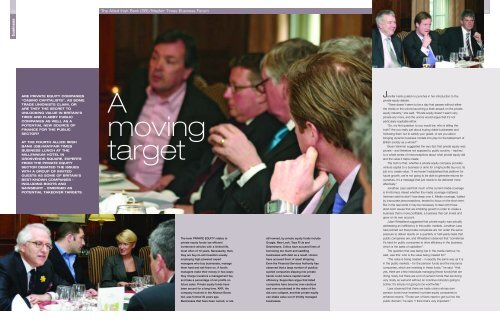JERMAIN DEFOE Thinking On His Feet - Mayfair Times
JERMAIN DEFOE Thinking On His Feet - Mayfair Times
JERMAIN DEFOE Thinking On His Feet - Mayfair Times
You also want an ePaper? Increase the reach of your titles
YUMPU automatically turns print PDFs into web optimized ePapers that Google loves.
32 The Allied Irish Bank (GB)/<strong>Mayfair</strong> <strong>Times</strong> Business Forum<br />
33<br />
business<br />
ARE PRIVATE EQUITY COMPANIES<br />
“CASINO CAPITALISTS”, AS SOME<br />
TRADE UNIONISTS CLAIM, OR<br />
ARE THEY THE SECRET TO<br />
UNLOCKING VALUE IN BRITAIN’S<br />
TIRED AND FLABBY PUBLIC<br />
COMPANIES AS WELL AS A<br />
POTENTIAL NEW SOURCE OF<br />
FINANCE FOR THE PUBLIC<br />
SECTOR?<br />
AT THE FOURTH ALLIED IRISH<br />
BANK (GB)/MAYFAIR TIMES<br />
BUSINESS LUNCH AT THE<br />
MILLENNIUM HOTEL IN<br />
GROSVENOR SQUARE, EXPERTS<br />
FROM THE PRIVATE EQUITY<br />
SECTOR DEBATED THE ISSUES<br />
WITH A GROUP OF INVITED<br />
GUESTS AS SOME OF BRITAIN’S<br />
BEST-KNOWN COMPANIES –<br />
INCLUDING BOOTS AND<br />
SAINSBURY – EMERGED AS<br />
POTENTIAL TAKEOVER TARGETS<br />
A<br />
moving<br />
target<br />
The term PRIVATE EQUITY relates to<br />
private equity funds: tax-efficient<br />
investment vehicles with a limited life,<br />
most often of 10 years. Necessarily, then,<br />
they are buy-to-sell investors usually<br />
employing high-powered expert<br />
managers who buy businesses, manage<br />
them hard and sell them on. A fund’s<br />
managers make their money in two ways:<br />
they charge investors a management fee,<br />
and take a percentage of net profits on<br />
future sales. Private equity funds have<br />
been around for a long time. KKR, the<br />
company involved in the Alliance Boots<br />
bid, was formed 30 years ago.<br />
Businesses that have been owned, or are<br />
still owned, by private equity funds include<br />
Google, New Look, Toys R Us and<br />
Debenhams. Critics have accused firms of<br />
borrowing too much and saddling<br />
businesses with debt as a result. Unions<br />
have accused them of asset stripping.<br />
Even the Financial Services Authority has<br />
observed that a large number of publicly<br />
quoted companies slipping into private<br />
hands could reduce capital market<br />
efficiency. Supporters argue that listed<br />
companies have become over-cautious<br />
and over-scrutinised in the wake of the<br />
dot.com collapse, and that private equity<br />
can shake value out of timidly managed<br />
businesses.<br />
Jennifer Harris pulled no punches in her introduction to the<br />
private equity debate.<br />
“There doesn’t seem to be a day that passes without either<br />
the media or the unions launching a fresh assault on the private<br />
equity industry,” she said. “Private equity doesn’t seem very<br />
private any more, and the unions would argue that it’s not<br />
particularly equitable either.<br />
“So, my first question to you would be: who is telling the<br />
truth? Are you really just about buying viable businesses and<br />
hollowing them out to satisfy your greed, or are you about<br />
bringing dynamic business models into play for the betterment of<br />
British society as a whole?”<br />
Bryan Vaniman suggested the very fact that private equity was<br />
private – and therefore not exposed to public scrutiny – had led<br />
to a whole series of misconceptions about what private equity did<br />
and the value it helps create.<br />
The truth is that, whether a private equity company provides<br />
venture capital to a business or aims for a high-profile buy-out, its<br />
job is to create value. “If we haven’t established that platform for<br />
future growth, we’re not going to be able to generate returns for<br />
ourselves. It’s a message that just needs to be delivered more<br />
effectively.”<br />
Jonathan Lass said that much of the current media coverage<br />
is ill-informed. Asked whether the media coverage mattered,<br />
Vaniman said he didn’t lose sleep over it. Media coverage, fuelled<br />
by inaccurate preconceptions, tended to focus on the short term.<br />
But in the real world it may be necessary to deal with those<br />
short-term issues that are inhibiting growth in order to create a<br />
business that is more profitable, a business that can invest and<br />
grow on its own account.<br />
Julian Wheatland suggested that private equity was actually<br />
addressing an inefficiency in the public markets. Jonathan Lass<br />
had pointed out that private companies are not under the same<br />
pressure to deliver results on a quarterly or half-yearly basis that<br />
public companies are, and Wheatland observed that “sometimes<br />
it’s hard for public companies to drive efficiency in the business,<br />
which is the basis of capitalism”.<br />
The question that was being lost in the media clamour, he<br />
said, was this: who is the value being created for?<br />
“The value is being created – in exactly the same way as it is<br />
in the public markets – for the pension funds and the insurance<br />
companies, which are investing in these funds,” he said. “And,<br />
yes, there are a few individuals managing [those funds] that are<br />
doing nicely, but there are a lot of pension funds that are doing<br />
very nicely as well and without an incentive nobody’s going to<br />
bother. It’s simply not going to be worthwhile.”<br />
Lass observed that there are trade unions whose own<br />
pension funds have invested in private equity companies to<br />
enhance returns. “Those sort of facts need to get out into the<br />
public domain,” he said. “I think that’s very important.”
















